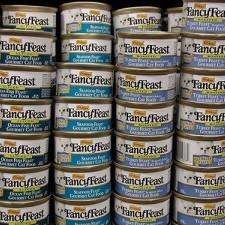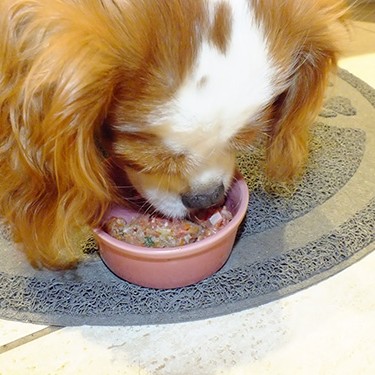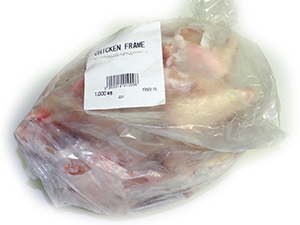I am quite upfront in letting people know that I maintain a healthy level of scepticism when it comes to pet food companies. In a nutshell, I believe the extensive processing the food undergoes before it turns up in the pretty pack with a picture of your favourite breed on the front (I admit falling victim to that), the low quality and questionable sources of the ingredients, the critically low levels of moisture in dry food, the highly debatable nutritional value of many dry and tinned pet foods and the long term impact of these products on our pets is a huge concern. I also suspect it could be a contributing factor in the high rates of serious and chronic health issues among our pets.
THE PROCESS
Personally, having had to pay attention to my own health and lifestyle as a result of auto-immune illness, I don't believe food that has been commercially constructed can truly deliver optimum nutritional benefits. Such 'food' is often made from low quality or imported ingredients and those that come from questionable sources, which have been ground up into a powder before being mushed together with some 'added vitamins and minerals' to make up for what's lacking in the ingredients or to bolster what is lost through processing, steam cooked, pushed through high pressure extrusion machines to get the 'cute' little bikkies and then dehydrated with a hot air dryer, sometimes before being sprayed with fat and flavouring at the end, prior to being stored and packaged, then stored, transported and shipped overseas, then stored upon arrival in Australia, then transported to retailers and stored, then sold to you... you get my point?
Even with Australian made products, the amount of heating and processing involved in getting the 'food' into these little dry shaped biscuits is excessive, and at the end of the day they may be a convenient way to feed our dogs and cats and there's no question that they have a long shelf life, but how nutritional can they possibly be?
Increasing numbers of pets are being diagnosed by vets as having serious and chronic illnesses, diabetes, pancreatitis, heart, kidney and other organ failure and cancerous tumours.... and even more of us are scratching our heads and possibly spending hundreds of dollars trying to solve Fido's persistent itching or Kitty's upset tummy.
The processing results in reduction and destruction of important natural enzymes, vitamins and minerals. Certain enzymes are necessary to assist dogs and cats to digest their food and to obtain the most nutrients from their diet. For this same reason, I am not a great advocate of feeding pets cooked meals either, unless there is a good reason for that individual animal (which there can be). The cooking process can actually destroy the good nutrients, particularly anti-oxidants which help slow the degenerative diseases of old age including heart and kidney disease and arthritis.


WHAT ABOUT TINNED FOOD?
I believe tinned pet food is not much better. While it offers a higher level of moisture than dry kibble, which is a critical reason why dry kibble is harmful to your pets, and some contain higher quality protein sources, have you actually checked what's on the ingredients panel in your tinned food?
Have you researched what each of these ingredients is, where it comes from, how 'good' it actually is? What percentage of these ingredients come from healthy, high quality sources? How many additives are in there by way of colouring, thickening agents, flavouring? Some of the ingredients in popular premium tinned pet foods contain ingredients that are suspected or known to be harmful to humans so how can it be okay for our pets?
I used to keep a can or two of tinned food in the cupboard as back-up. I don't do that anymore. I still keep a back-up, but it is usually fresh, raw chicken breast which I keep in the freezer as an emergency.
JUST WHERE DOES IT COME FROM?
Many of the products on the shelves are made overseas in countries such as the US from imported ingredients (one particular 'premium' brand that is recommended by many vets). I try as best I can to avoid buying imported foods for my own family, so why would it be okay to feed imported foods to my dogs that could come from countries such as China who use excessive amounts of pesticides and chemicals and have extreme levels of ground and air pollution.
I have had my own negative experience with pet jerky from China that are sold in local pet stores and supermarkets - my dog almost hyperventilated after eating one single piece of chicken jerky, for hours she was restless and panting heavily. It took a few times for me to connect her reaction to the jerky and I have never touched the stuff since. It also made me more aware of the need to scrutinise where my dogs' food comes from and what's in it.
Alarmingly, every year there are many safety recalls of commercial pet food products.
THE DOLLARS
Undeniably, the pet food industry is a mega-monster attracting many billions of dollars of profits every year. With their big marketing budgets and 'scientific research' the bigger companies have the power to persuade retailers, veterinary practices and pet owners that their brand of dry food is the most beneficial diet for our pets.
Whether vets get kickbacks from promoting and selling these commercial products is one question - that's business - but the more important question is whether they personally believe that such food is nutritionally beneficial and is not actually contributing to many of the illnesses they are dealing with on an increasing basis.
Sadly, the majority of vet practices and pet store retailers aren't willing to make a stand for the true health of our pets - it comes down to profits and margins. Therefore, we as pet owners need to make our own informed decisions, free from commercial persuasion for the health of our dogs and cats.
Yes - I hope to make a small profit from selling raw food for dogs and cats, but my greatest mission is to educate as many dog and cat owners as I can that feeding entirely raw, or in the very least making raw food a substantial part of their pet's diet, is the most beneficial feeding option for the long term health of our pets. I know that not everyone can afford to feed solely raw, particular with the bigger dogs, but my hope is that you will consider substituting one meal of the dry kibble per day with good quality raw food... as a very minimum. Your dogs and cats will appreciate it and their health will benefit from it.
"I guess in really simple terms you can compare it to the engine of a car and the type of fuel you use. Just because you use high octane gas in a car that doesn't need it, it's not going to do any damage, but if you use poor quality fuel, regardless whether it is high or low octane, there will be buildup in the engine that hampers performance and will eventually lead to damage."
[http://www.dogfoodproject.com/index.php?page=protein_myth: page last visited 10/2/15]
As with the human race, I think some lucky dogs will get by on a commercial diet and may live to a good age, but for so many others the effects on their health will be detrimental and their lives shortened as a result.
SO, WHAT DO I FEED MY PETS?
I believe the best, most nutritionally beneficial diet for our dogs and cats is a raw diet consisting of suitable quantities of meat/bone/fat, fresh vegetables and fruit, healthy oils, some eggs with their shells and a few additional ingredients to support natural health and vitality.
A raw diet, also commonly referred to as BARF ("Biologically Appropriate Raw Food"), is very minimally processed and is not cooked or heat treated thereby retaining the beneficial enzymes and the natural qualities of the ingredients. Other pet owners choose to follow different models of raw feeding with essentially the same ethos - to feed as close as possible to a natural diet the animal would eat in the wild, free from grains, preservatives, colours, additives, flavours, enhancers, thickeners, etc.
I choose to give our young dogs a variety of BARF products and I aim for an overall balance of various ingredients over time. They enjoy a variety of white meat and red meat BARF including chicken, turkey, duck, fish, lamb, beef and roo. They don't have any allergies or sensitivities to any of their raw diet so feeding a variety is fantastic for them. I also give them raw bones (chicken necks, chicken frames, roo tail) about once every 10-14 days and less frequently they may have some sardines. I seek out (or make my own) naturally preserved or dehydrated 'treats' such as roo tendons, dried fish skins, dehydrated chicken jerky and sweet potato chews.
Since going all raw, my dogs coats have improved in texture, thickness and appearance, they don't seem to shed as much fur, their breath is healthy, their poos are smaller and smoother and less smelly, they don't need to gulp copious amounts of water after eating... and the long term results - time will tell.
I am buoyed by meeting friends who have senior dogs aged 10-12+ who have been fed a mostly raw diet and who are still going strong, despite a few annoying niggles of old age of course. I am confident of the thoughts and theories behind getting our pets back to a more natural diet.
Our cat... well, she's been eating a diet with a relatively high proportion of dry kibble for most of her 11+ years so the transition was slower than the dogs and she tends to be a bit fussy. I made the commitment to change her to a raw diet for improved health and although it was a gradual process over a period of a few months, she is now all raw and loving it. At 12 years old she has become brighter, more energetic and more engaged with us. Albeit later in her life, I am so glad I have changed her to a raw diet and ditched the dry altogether!

INTERESTING LINKS
The links below are included for information and interest purposes only. Raw Health 4 Dogs does not necessarily support or agree with everything that has been written, nor has Kelly Davidson read every single word on every page of the sites. Use your own judgment.
http://www.dogfoodproject.com/index.php?page=main
